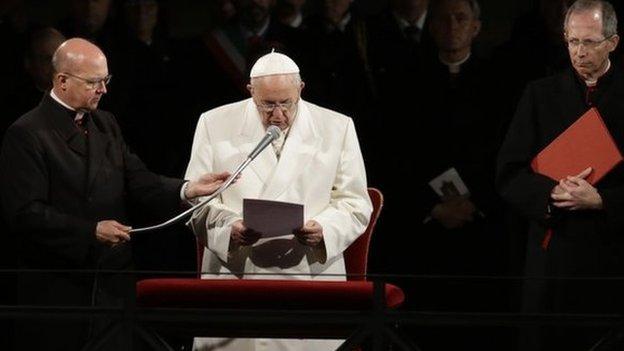Archbishop of Canterbury's Easter sermon focuses on persecution
- Published
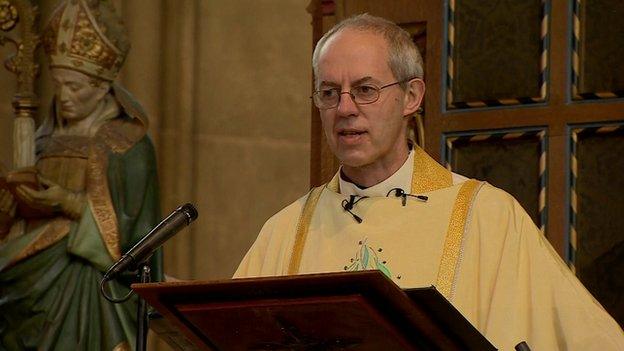
Archbishop of Canterbury Justin Welby said there had been "so many martyrs in the last year"
Christians should resist persecution without using violence, the Archbishop of Canterbury Justin Welby has said in his Easter Sunday sermon.
In his Canterbury Cathedral sermon, he spoke of the 148 victims of a Kenyan university attack last week and Coptic Christians killed in Libya in February.
The Queen, Prince Philip, and members of the Royal Family attended an Easter service at Windsor Castle.
In his message, Pope Francis called for peace "above all" in Syria and Iraq.
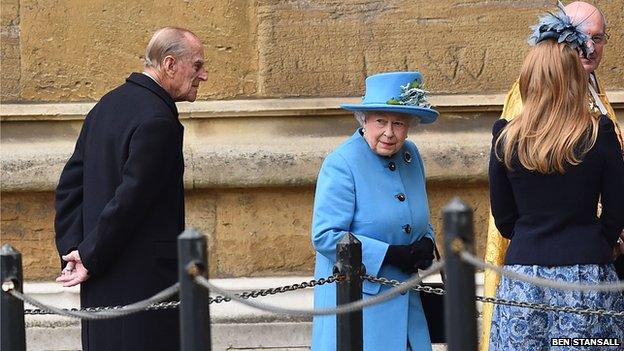
The Queen and the Duke of Edinburgh attended the traditional Easter Service at St George's Chapel, Windsor
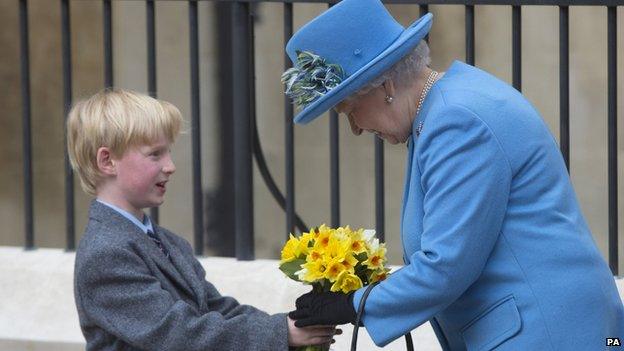
The Queen was presented with daffodils by a boy after the Easter service
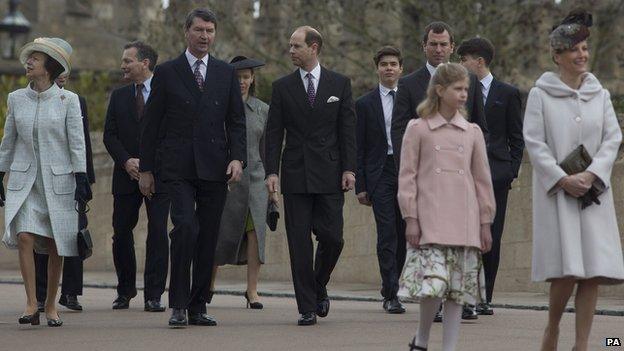
The Princess Royal and the Earl and Countess of Wessex also attended the service
In his Easter "Urbi et Orbi" message, the Pope prayed for the students killed in Garissa in Kenya and called for more action to halt what he said was a "humanitarian tragedy" in Syria and Iraq.
The Pope "implored" peace in Libya, calling for the "absurd bloodshed and all barbarous acts of violence" in the country to end.
"We ask for peace, above all, for Syria and Iraq, that the roar of arms may cease and that peaceful relations may be restored among the various groups which make up those beloved countries," he told crowds in St Peter's Square.
Three days of national mourning are being held in Kenya for nearly one hundred and fifty people, many of them Christian, who were killed by Islamist militants last week.
In February, 22 Egyptian Coptic Christians were beheaded by Islamic State (IS) militants in Libya.

Analysis
Caroline Wyatt, BBC religious affairs correspondent
It is an Easter of suffering for many Christians around the world, a fact highlighted by the Pope and the Archbishop of Canterbury, as well as the Archbishop of York, in their Easter homilies.
Much of the news in the months leading up to Easter 2015 has been dominated by the killing of Christians, most recently the students in Kenya - many explicitly because they were Christian - and earlier in Libya, Syria and Iraq by Islamic State (IS) militants, who appear determined to drive those of other faiths from the areas they control, including other Muslims who do not subscribe to their extreme interpretation of Islam.
There is growing concern among Christian leaders over the murder of Christians by Islamist militants in many parts of the world, as the ideology of IS, Boko Haram and al Shabab and others spreads its message of death and hatred.
While the Pope and the archbishop have called on Christians to listen to the Easter message of the risen Christ today and forgive their persecutors, Pope Francis has made it clear for some time that he believes military force is justified to halt the advance of IS militants.

Christian support
The three main UK party leaders also highlighted the persecution of Christians abroad as they took a break from election campaigning to mark Easter.
Prime Minister David Cameron, who attended a church service in Oxfordshire, said it was "shocking" to know people abroad were still being "threatened, tortured - even killed" because of their faith.
Labour leader Ed Miliband said Christians were the victims of religious discrimination in the world, saying "our hearts go out to those who face difficult times both overseas and closer to home".
In a message on Twitter, external, Liberal Democrat leader Nick Clegg wrote of the "cruel and barbaric killings that took place in Kenya".
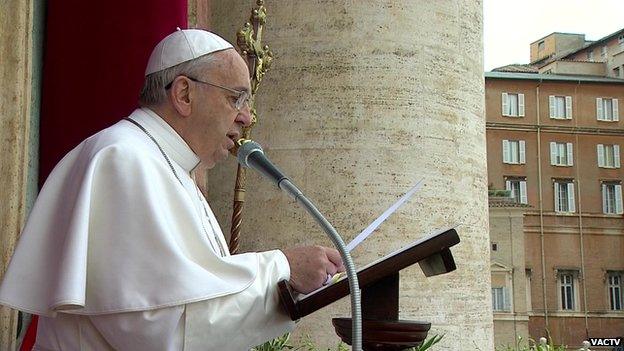
Pope Francis, who delivered his Urbi et Orbi message in Rome, called for peace "above all" in Syria and Iraq
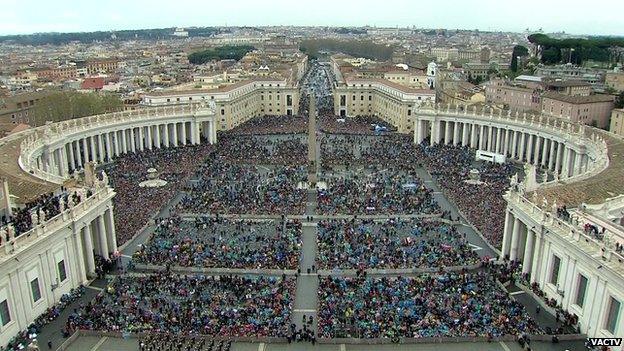
Tens of thousands gathered in St Peter's Square to hear Pope Francis
The Archbishop of Canterbury said Christians must support persecuted communities, with "love and goodness and generosity".
He spoke of the need for all Christians to bear witness to Jesus Christ and the resurrection and stated that age, gender, politics and sexuality were irrelevant.
"Witnesses are those people who know Christ - lay or ordained, old or young, gender, politics, sexuality or whatever irrelevant - all are equally witnesses. To witness is to be a martyr," he said.
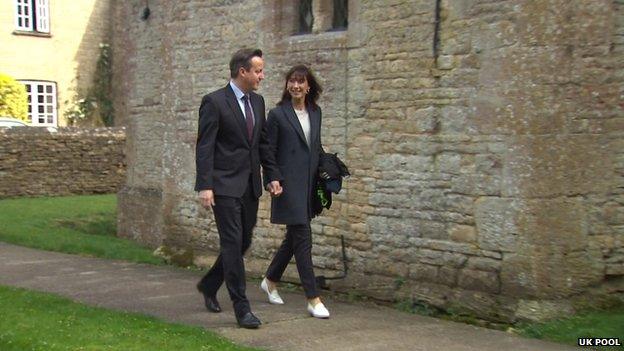
David Cameron, who attended a service with his wife Samantha in Oxfordshire, published a YouTube message
The archbishop continued: "I am told by the Coptic Bishop in England that the Coptic Christians murdered in Libya last month died proclaiming that Jesus Christ is Lord.
"They are martyrs, a word that means both one that dies for their faith and one that witnesses to faith.
"There have been so many martyrs in the last year. On Maundy Thursday, three days ago, around 150 Kenyans were killed because of being Christian.
"They are witnesses, unwilling, unjustly, wickedly, and they are martyrs in both senses of the word."
This view was echoed by the Archbishop of York, Dr John Sentamu, who said that Christians were at greater risk in many parts of the world because "they follow Jesus Christ".
In an article in the Mail on Sunday , externalhe also urged Christians to be politically involved, calling on people to "engage and vote."
- Published15 February 2015
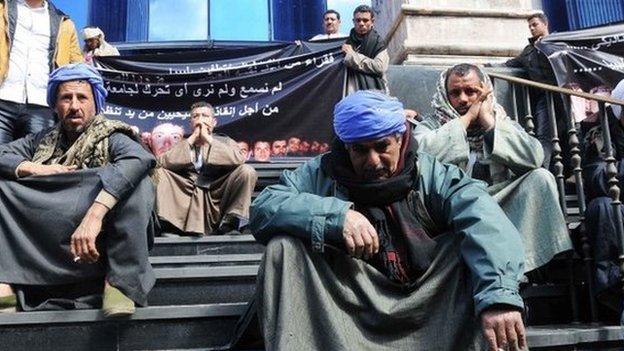
- Published4 April 2015
